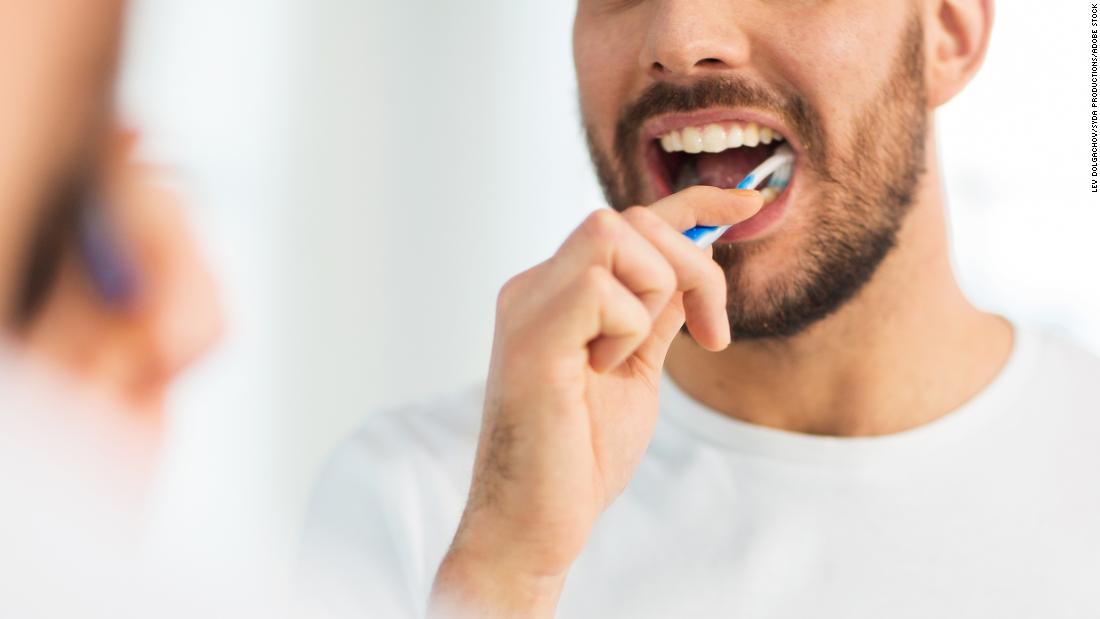These 5 habits can spoil your teeth 1:30
Editor's Note:
The opinions expressed in this article are solely those of the writers.
CNN presents the work of The Conversation, a collaboration between journalists and academics to provide news analysis and commentary.
The content is produced solely by The Conversation.
(
The Conversation
)
- Many of us are familiar with the advice that we should brush our teeth twice a day and for at least two minutes each time.
Many of us overestimate how long we brush our teeth, up to a full minute in some cases.
And yet there is some evidence that even two minutes of brushing may not be enough.
According to research, to remove as much plaque as possible, more is better, with the best results in three to four minutes.
Does that mean we should double our brushing time?
Flossing May Protect Against Cognitive Decline, Research Finds
Dentists began recommending that we brush our teeth for two minutes in the 1970s and later use a toothbrush with soft bristles.
However, the current consensus is based primarily on studies published since the 1990s, which looked at brushing times, techniques, and the type of toothbrush.
These studies showed that two minutes of brushing led to good (but not great) plaque reduction.
But while brushing for more than two minutes has been shown to remove more plaque, there is still a lack of research looking at whether more than two minutes of brushing is linked to better long-term oral health compared to two minutes.
advertising
However, based on what we know about the damage of plaque overgrowth, it is likely that each time we brush and remove more plaque is linked to better oral health.
It is also important to note that this lack of evidence is because long-term studies can be difficult to conduct.
When we brush our teeth, we do so with the main objective of removing microbes (known as dental plaque) from the surfaces of our teeth.
This plaque is a collection of bacteria, fungi, and viruses that live together in a community known as a microbial biofilm.
Biofilms are very sticky and can only be removed with a brush.
Many things can facilitate the growth of these microbes, including rough areas on the tooth surface (for example, some dental fillings), the inability to reach certain areas with a toothbrush (such as the spaces between the teeth) or the wearing braces. In fact, plaque biofilms grow back on our teeth within hours of brushing, so we are advised to brush twice a day.
Not brushing our teeth properly or for long enough can lead to higher levels of plaque, which can ultimately activate our body's immune response, eventually leading to inflammation and conditions like gingivitis.
The inflammation is usually not painful, but it often causes bleeding gums when brushing your teeth and sometimes bad breath.
Biofilms can also cause cavities.
Dental fillings can cause health problems 1:09
The proper technique
The goal of brushing our teeth is to reduce as much plaque as possible on each tooth.
Current evidence suggests that spending more time brushing your teeth - up to four minutes each time you brush - leads to cleaner teeth.
This longer brushing time means that we can clean our teeth more effectively and reach the hard-to-reach places.
But be careful not to brush your teeth too often (for example, more than twice a day) and avoid brushing your teeth vigorously or using abrasive toothpastes and toothbrushes, as this can also damage our teeth and gums, especially when using a toothbrush with stiff bristles or abrasive toothpastes.
There are many different brushing techniques that you can use to brush your teeth properly.
One of the most recommended is the modified "Bass" technique, which aims to clean at and below the gum line, the area where plaque forms first and is most likely to cause inflammation.
How often should you wash the sheets?
More often than you think
You should always brush your teeth with a gentle force, although at this point it is not conclusive how difficult it should be.
A gentle brushing is preferred to avoid damaging the hard and soft tissues of our mouth.
Many factors can affect the type of technique, toothbrush, and toothpaste or floss you use.
For example, people who may have damaged the surface of their teeth from drinking too many acidic sodas may have weaker teeth.
This can mean that they are more susceptible to more damage to their teeth if they use abrasive toothpastes and harder bristles.
It's worth consulting your dentist to find out what to use to brush.
Interdental cleaning — which most of us know simply as flossing — is also recommended in conjunction with tooth brushing.
Studies have found that both tooth decay and gingivitis can be reduced by flossing.
The most effective way to floss is to slide the floss between the gums and the tooth and hold it firmly against the tooth - so that the floss "hugs" it - and rub along the tooth surface with a gentle up and down motion by gently advancing the floss below the gum line.
Interdental brushes, which can be pushed between the teeth at the gum level, can be even more effective.
Less is known about other cleaning products - including toothpicks, water jets, or tongue cleaners - and their effectiveness.
While we may be used to the advice that we should brush our teeth twice a day for two minutes each time, it is important that we also focus on using proper technique to ensure that we brush our teeth thoroughly and properly.
Brushing for more than two minutes can also help us ensure that we remove more plaque from our teeth, which will likely lead to better dental health.
Are we dirtier in quarantine?
0:53
Josefine Hirschfeld is an academic clinical professor of restorative dentistry at the University of Birmingham.
Teeth care

